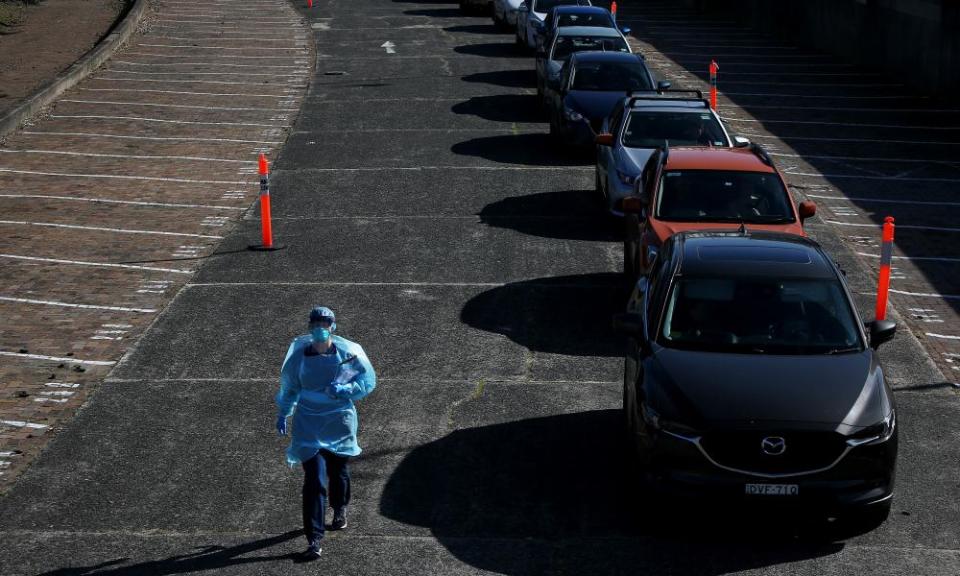Allocating blame for Covid-19 might be satisfying, but it is unhelpful

Early March seems like a lifetime ago. It’s easy to look back at those halcyon days with a sort of fondness, even a note of joy. Yes, there was sadness – a family member lost their job, my wife’s shifts were cut back and our income dipped substantially – but there were also many bright lights shining through lockdown. Friends organised a weekly trivia, and while we never won, we had a great time playing. A group of gamers got together with our Nintendo Switches and played endless hours of Mario Kart, having fun together even though we were legally mandated to be apart. It was sad, yes, but also exciting and fun, something new to liven up the tedium of day-to-day life.
Related: 'It has to work': the reins are tightening on a Covid-stricken Victoria, but how did we get here?
Six months later and it’s not fun any more.
Gone are the cheerful smiles as we enter yet another “weekly hang” with friends we’d rather see in person. The weekly family chats are sparsely attended, and while we’re all keeping in touch, the distance looms ever larger. Living in Sydney, we could even perhaps reinstate some of these gatherings, but everyone’s just a little too scared of what might happen, despite the technological exhaustion. We’ve all got Covid-19 fatigue, and even the vague thought that we might have to enter lockdown again is a terrifying weight on all of our minds.
We watch our friends in Melbourne and cannot even imagine their pain and sorrow.
In this blue atmosphere, the thing that’s picking up more than anything else is the blame game. It’s not surprising – we’re all human, and when we are suffering we need someone or something to blame. “Australia was doing so well,” we think, “It must be someone’s fault that we’re in this mess.”
The virus has made us all feel helpless, so we search desperately for someone to denounce
And so we go on the warpath, looking for a sacrificial lamb. Maybe it was a horny security guard who doomed us all, even though such a person still hasn’t actually been identified. Maybe it’s the government, who adopted masks too late, or too early, depending on your political persuasion. Maybe it’s those dastardly people who keep breaking quarantine despite the many government warnings and are obviously spreading the virus (of course, you too broke lockdown half a dozen times back in April, but that was different somehow). Maybe it’s society itself, that doesn’t allow casual workers the time off to be sick and demanded that essential workers sacrifice their health and even their lives to keep the economy moving even before the pandemic started.
The problem is that this allocating of blame is, at best, unhelpful. In the autopsy of “what went wrong in 2020”, there will almost certainly be people who did the wrong thing, and I’m sure we’ll spend countless gleeful hours dissecting their mistakes. But here and now, apportioning blame is all but impossible. Sure, some teenagers broke the rules, but when we have had some politicians labelling lockdowns as worthless and national media figures dismissing the virus as harmless for the young, can we really blame them? If I was 18 again, ignorantly confident in my own immortality, I too would maybe think that this whole thing was a bit overblown.
Related: Going viral: five of the most important things we’ve learnt about Covid-19 so far | Hassan Vally
As with everything this year, it feels like a tired phrase, but we really are all in this together. Angrily decrying people’s perceived mistakes, while sometimes satisfying, doesn’t really help any of us. The virus has made us all feel helpless, so we search desperately for someone to denounce, even though the reality is that it’s Covid-19 that’s really the issue here. Pointing the finger of blame may feel good, but often we don’t really have enough evidence to even know who is at fault, never mind how bad the slip-up might have been. The one constant in this year of change is how little we truly understand about what’s happening, because the simple fact is that none of us have ever dealt with a situation like this before.
I don’t expect people to stop blaming each other – as I said, we’re all human after all. In the face of an uncertain future, we want (or maybe even need) something to get angry about. We might be unsure of what’s going to happen next – and as an epidemiologist, I can tell you it is incredibly hard to predict – but in spite of that it’s worth remembering most people really are trying their best.
I guess what I’m saying is to love your neighbour. Hopelessly cliche, perhaps, but maybe there’s a reason that such sayings are burned so deeply into our collective consciousness. We might eventually find a single person to blame (although I think it’s unlikely), but in the meantime we can really only get mad at the virus itself, because ultimately Covid-19 is behind all of this damage. It might not be as satisfying to yell at a microorganism as a person, but I can assure you it’s remarkably cathartic.
• Gideon Meyerowitz-Katz is an epidemiologist working in chronic disease

 Yahoo News
Yahoo News 